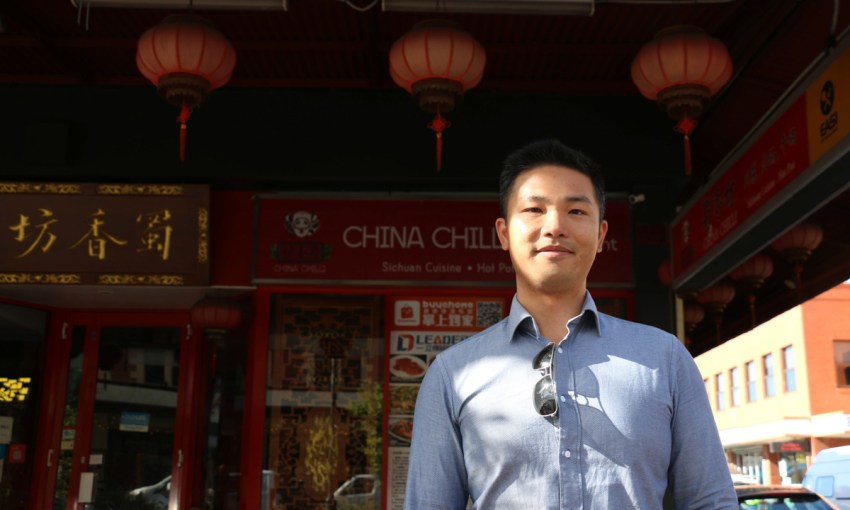Central ward councillor Jing Li says when the Chinatown community needed its leaders most, they were “silent”. The recently installed councillor speaks with CityMag about how he plans to serve his constituents.
Jing Li is entering his advocacy era
Undoubtedly, 2020—22 was a bad time for everyone. But the residents and businesses in postcode 5000’s southwest pocket of Chinatown arguably felt it more than the average South Australian.
The migrant community’s hub was beleaguered with crushing vacancy rates, riddled with scandals such as the Gouger Street Fun Tea shop assault, subjected to rising rates of racism, and felt the absence of swathes of customers and workers returning home and not spending their cash in the precinct.
Looking back on this period, recently installed central ward councillor Jing Li says he felt let down by Chinese community leaders.
“They were quite silent, to be honest,” Jing tells CityMag while sipping on a flat white at Zuma Caffe.
“The Fun Tea incident, I believe it brought significant damage to the reputation of our community and this precinct.
“It actually became an international scandal. I have friends in the USA, New Zealand, China, Japan [and] Singapore asking me about the incident.”
—Simon Hou
There were leaders present in the Chinatown community at that time though, including one of Jing’s colleagues on council.
Simon Hou has been a central ward councillor since 2018, and on his councillor page outlines his history of community service in Adelaide as “predominantly to the Chinese community”.
In 2021, Simon explained to CityMag he had spoken to the Chief Medical Officer Nicola Spurrier on behalf of a small portion of the non-English-speaking community, advocating for more precise translations on pandemic-related health warnings and directions.
During Simon’s time in the chamber, CityMag also witnessed him progress motions supporting Chinatown night markets and stalls. The aim was to breathe new economic life into the area.
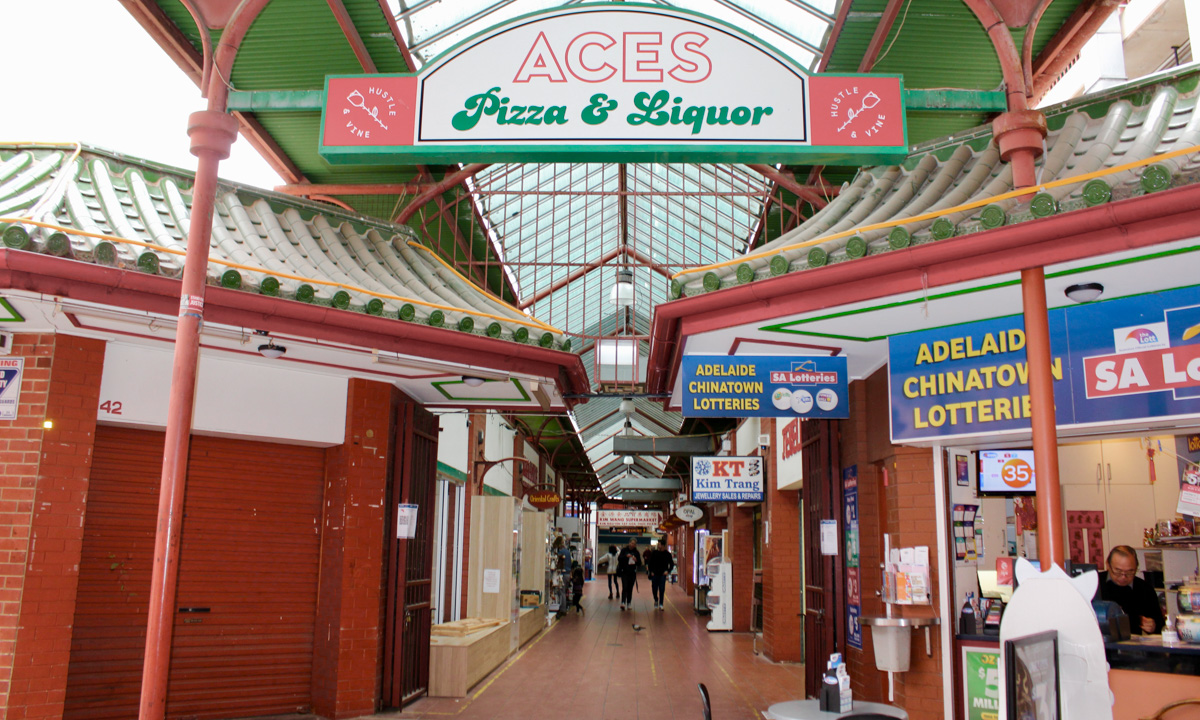
Chinatown — pre-Adelaide Arcade development. This picture: Chelsea Chieng
However, Simon was also embroiled in a messy controversy over his remarks surrounding the alleged Fun Tea assault, with members of the Chinese-speaking community calling for his resignation.
Simon tells CityMag Chinatown’s community leaders have been working “tirelessly” during the challenging times of the pandemic, and labelled Jing’s description of them as silent as “disgraceful”.
“If Mr. Li is not aware of their efforts, then perhaps he should engage with them directly,” he says.
“Many individuals, including Cathy Chong, the president of the South Australian Chinese Welfare Association and Tianbo Zhang, the president of the Chinatown Association, and his wife Mingwei, have been actively sharing updates and information about COVID-19 with the community.
“Wayne Chao, the president of the Gouger Trader Association, has also been using his media company to share translated information from mainstream media with the community.
“There are many other community leaders who have contributed to protesting discrimination and promoting the prosperity of Chinatown businesses, such as Irena Zhang, David Wong, Peter Yang, and Genargi Xia.”
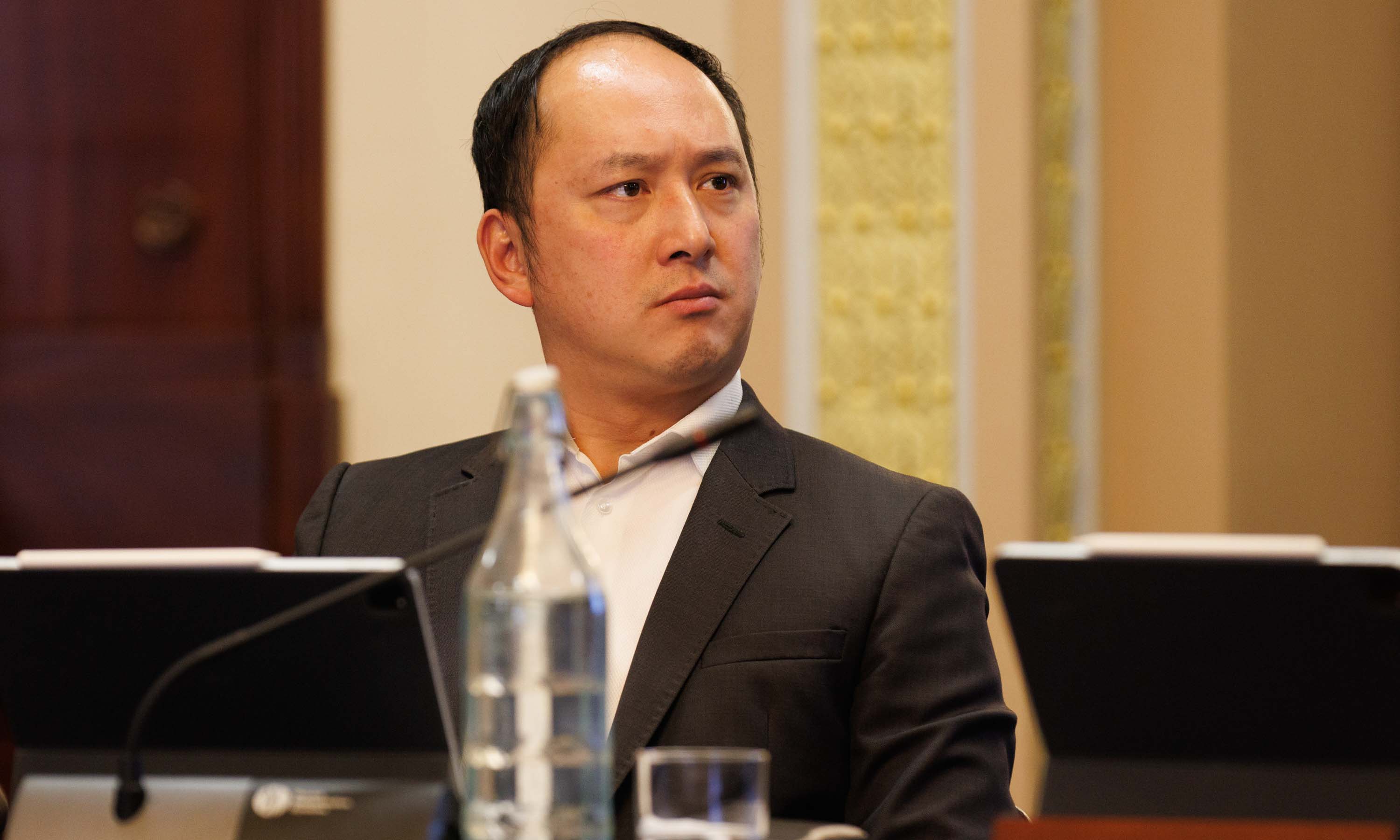
Simon Hou at Adelaide Town Hall. This picture: Tony Lewis
Simon says the Fun Tea “incident” was “blown out of proportion by some individuals” and social media, leading to “misinformation and misunderstandings”.
“I have already addressed this incident publicly and apologized (sic) for any unintentional offense (sic) caused by my remarks,” he tells CityMag via email.
The café where we’ve met Jing, who is already a controversial figure on city council, is only a little way up the road from Moonta Street, the beating heart of Chinatown. From where we’re sitting, we can see one of the two paifangs which bookend the city laneway. Each of the entryways is guarded by a pair of grey lion statues, donated by the Adelaide City Council and the Chinese government.
Although the pagoda-styled roofs and red lanterns — which first popped up in the 1970s as Chinatown came into its physical being in the city — are artefacts of the neighbourhood’s historical origins, the area is shaking loose its old bones. Today, there’s a lot more on offer here than Chinese food. There are karaoke bars, phone repair shops and international food chains (like Krispy Kreme) in abundance.
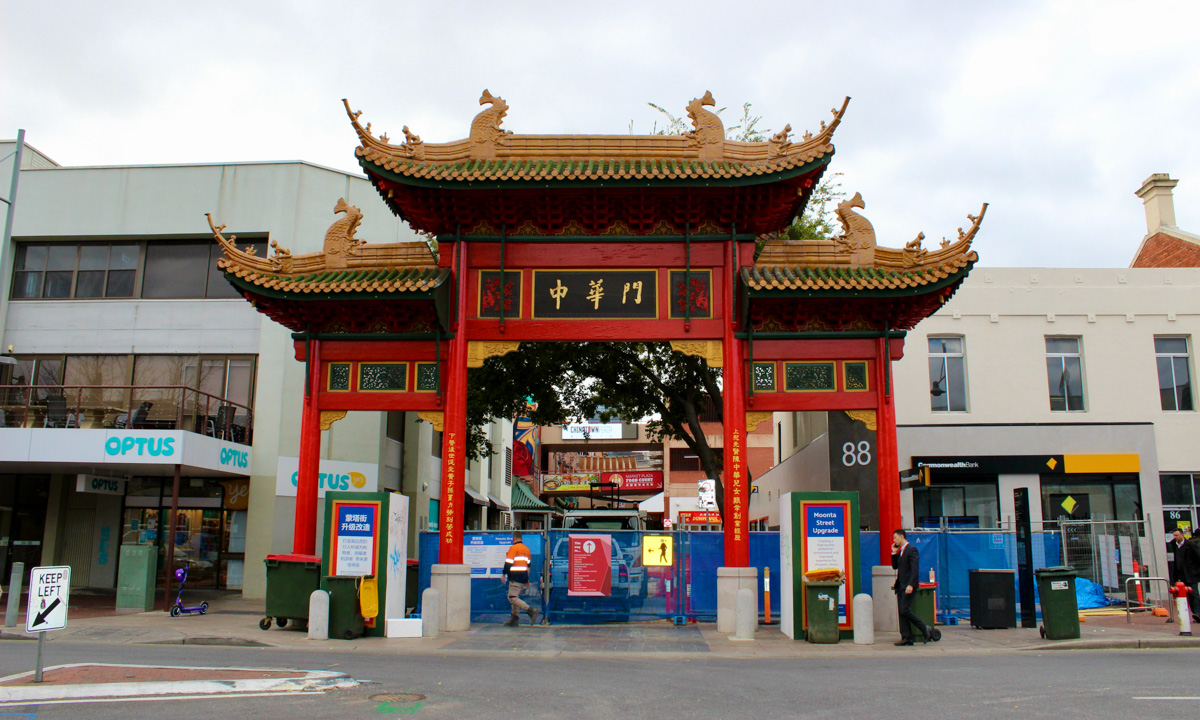
One of the Moonta Street Paifangs. This picture: Chelsea Chieng
Jing wants the needs of Chinatown in 2023 to be reflected in city policy. This includes forming concrete relationships with local Mandarin and Cantonese media outlets, such as The Adelaide Eye and Today Adelaide, to deliver accurate news to the city’s non-English-speaking populace.
He believes non-English papers currently borrow news stories from English outlets and facts are being blurred in the process.
“There’s a little ecosystem, and their readership is probably 10—20,000 purely Chinese,” Jing says, “and we have about 50—60,000 Chinese speakers in South Australia, depending on how you measure it.
“I believe a lot of the council information, they are not picking up.
“I’m trying to push an initiative where the administration can spare some time to publish… half a dozen reports that the multicultural community should be aware of.
“The local community media could pick up the message properly, translate them and feed [them back into] the community.”
—Jing Li
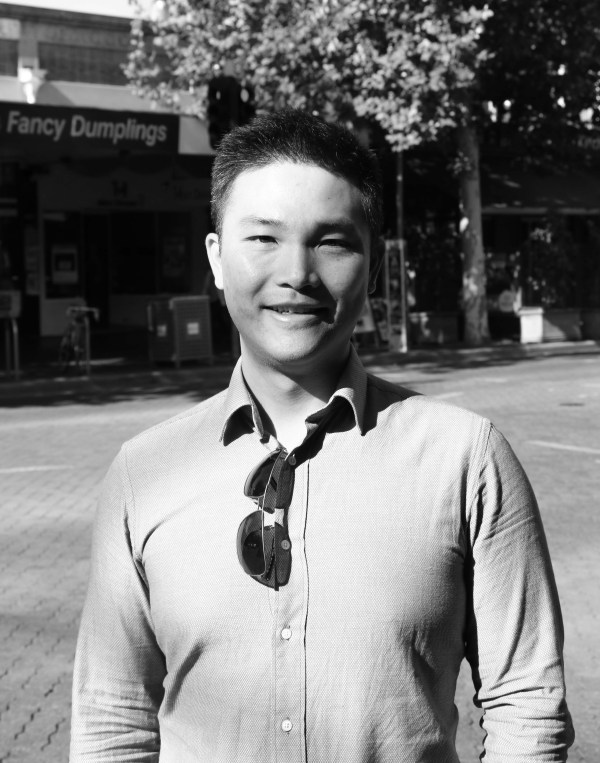
Jing boasts 14 years of professional experience working in the financial and international investment sectors and has a keen interest in China-Australia relations. He graduated from the University of Adelaide’s school of economics as an international student in 2017.
Since 2019, Jing has been employed as a strategic advisor to the Australia China Business Council — a bilateral organisation dedicated to fostering economic relations between the Asia Pacific powerhouses. He is currently employed as a global engagement manager at the Australian Trade and Investment Commission.
But Jing has had less than admirable brushes with federal figures. The most recent flare up was with South Australian senator Alex Antic — a former Adelaide city councillor — who used parliamentary privilege to name Jing as the alleged culprit behind a voting fraud scandal in the 2022 general elections.
In November, our sister news publication InDaily reported that South Australia’s Electoral Commissioner Mick Sherry confirmed a crime had been committed in the city council elections. As a result, more than 20 Adelaide City Council central ward ballots were rejected from the count.
The ballots came from four apartment buildings in the Adelaide City Council central ward, where a vote harvesting scam targeting international students was alleged to have taken place.
The commissioner told InDaily an investigation was underway and would take “several months” to garner results.
CityMag has asked ECSA repeatedly about the status of the investigation and who is being investigated, but a spokesperson says they cannot comment on an active investigation.
“ECSA will fully cooperate with any request from the court and produce all necessary information to allow it to determine the matters before it,” the spokesperson says.
Jing says he’ll “wait for the investigation” and “I don’t have to prove I’m innocent.”
“I would encourage a full investigation, not an investigation based on the accusation targeting myself, as if I have to prove I’m innocent,” he says.
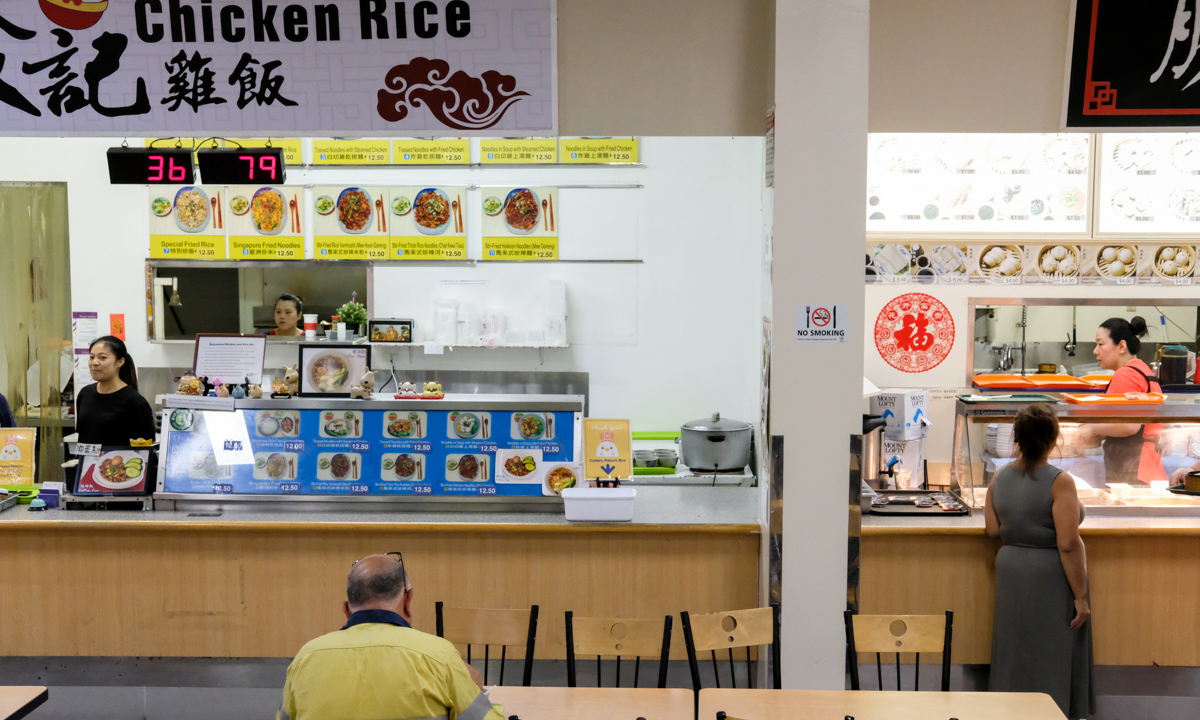
Central Market food court. This picture: Johnny von Einem
In addition to the voting scandal, a band of failed Adelaide city council candidates is also contesting the 2022 general election results in the Court of Disputed Returns.
While ECSA does its job, Jing is concentrating on his.
In line with his other multicultural policies, he has his sights set on pushing the police minister Joe Szakacs to employ Chinese-speaking police officers to patrol Chinatown.
“English is a barrier, and then you see a police person and you will say, ‘Oh, it’s too hard; it’s just an incident, we’ll just let it pass’,” Jing says. “I feel the same.”
He says “many” people in the community have expressed their reticence to approach street cops due to the perceived language barrier, and Jing wants to help foster communication to address this problem. He believes the skills he’s picked up working in finance and federal government mean he’s the best person to advocate for his community.
“I’ve got a federal government role, I’ve got significant experience and contacts at the government level and I’m a councillor, so I tried to play it as an advantage to get a few things done,” he says.



